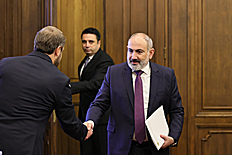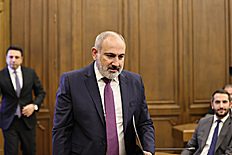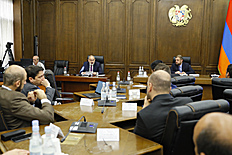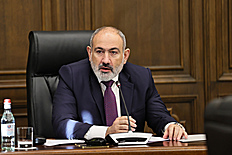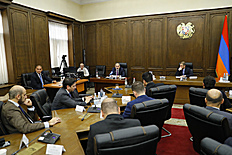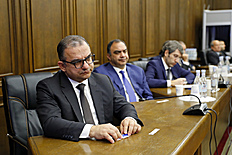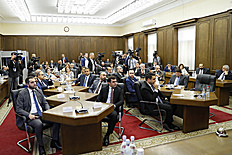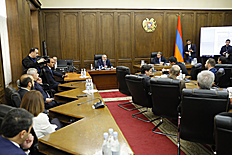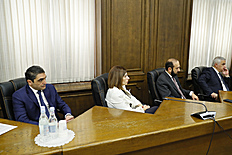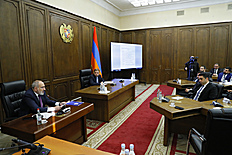Statements and messages of the Prime Minister of RA
Motherland is the state. If you love your motherland, strengthen your state. Prime Minister's speech at the discussion of the draft state budget 2024 during the joint session of the National Assembly Standing Committees
more 7 photos
Honorable President of the National Assembly,
Dear Vice Presidents,
Dear Cabinet members,
Dear MPs,
We are starting the parliamentary discussions of the draft state budget of the Republic of Armenia for 2024.
This discussion, like in the previous years, is taking place in a tense regional and international environment. This is not new for us, and in the last three years, of course, we have discussed the draft budget for the coming year under conditions of varying degree of tension.
The international situation has significantly worsened in the last two years. The possibility of nuclear war has become a serious topic of discussion among experts and politicians. We live in the midst of the collapse of the world order established in our planet since the end of the Cold War.
This situation creates serious threats for the Republic of Armenia. But competent management of these threats can create equally serious opportunities for our state.
I consider it important to emphasize that in order to manage threats, we first need to carry out intellectual, conceptual work, the main goal of which is self-reflection, the analysis of the key aspects of our 32-year statehood, state life.
What is independence for us? What is our collective understanding of sovereignty and independence? What kind of tool is statehood for us and what purpose do we need it to serve? These are issues the political, expert, public debate of which is a national security agenda. Refining the conceptual foundations of our statehood is key to ensuring our competitiveness and viability in a changing world.
This, of course, is one of the most important parts of the work of the government and the Prime Minister himself. The five-year experience of my prime ministership, full of public happiness and tragedies, has led me to the following conceptual formulation, which I want to propose as a state conceptual guideline. That guideline is as follows: "Motherland is the state. If love your motherland, strengthen your state" Let me repeat, with your permission, one more time: "Motherland is the state. If love your motherland, strengthen your state" This wording or motto stems from the thesis, perhaps from the realization or perception that during the 32 years of our independence, our key problem was the existing and continuously increasing tension between the interests of the State and the motherland, conventionally speaking, the sometimes opposite directions of gravity of the motherland and the State, the impossibility of making a choice between motherland and the State. But no matter how impossible the choice is, it must be made, and at the moment of making that choice comes the most important awareness and realization that the state is the only and irreplaceable motherland and the state and its independence, sovereignty, territorial integrity, establishing and developing institutions, contributing to that cause is the superordinate degree of patriotism. This is a road to maturity, and we all go through that road: the government, the parliament, the expert community, and the public and the people in general.
Here, one of the key and very symbolic moments of that maturation was the demonstration of many thousands following my announcement from the National Assembly that the territory of the Republic of Armenia is 29,800 square kilometers, which made it obvious that we, as a public, do not have a very good idea of the size of the internationally recognized territory of our state, which is not so much a matter of knowledge as, in fact, the cornerstone of all the setbacks and failures we have suffered.
Our conclusion from all this should be unequivocal: the only tool for ensuring our security in the collapsing world order is the identification of the motherland with the state, its territory, its internationally recognized borders, its territorial integrity. And the above-suggested motto serves this purpose: "Motherland is the state. If love your motherland, strengthen your state"
Dear attendees,
The key practical issue arising from this perception, strange as it may sound, is the awareness of the geographical location of the state. I consider it important before engaging in the East-West, North-South global discussion to realize that we are in the South Caucasus region, we have four neighbors, and all the main threats and opportunities that we can have are hidden in our relations with them.
In this regard, it is important to further develop the friendly, cooperative nature of our relations with Georgia and the Islamic Republic of Iran, and to nomalize relations with Azerbaijan and Turkey.
I have to record once again that our plans include signing an agreement of peace and normalization of relations with Azerbaijan and the nmalization of relations with Turkey, even though we realize that it will not be easy. But moving forward with such a program is in the state interests of the Republic of Armenia.
Now, in this context, a natural question arises: how realistic is it to sign an agreement of peace and normalization of relations with Azerbaijan, especially with the logic that we have talked about, we said that we are trying, we will do everything to achieve such a result in the coming months?
Basically, I must record that the three main principles of peace and normalization of relations with Azerbaijan have been agreed upon, and if the parties remain faithful to those agreed principles, the signing of the agreement of peace and normalization of relations becomes realistic. I reiterate, if the parties remain faithful to the already agreed principles.
I want to remind those principles. First, the Republic of Armenia and the Republic of Azerbaijan mutually recognize each other's territorial integrity with the understanding that the territory of the Republic of Armenia is 29,800 square kilometers, and the territory of Azerbaijan is 86,600 square kilometers.
By the way, I want to say that it has not escaped our notice that the accuracy of these numbers, so to speak, is also a subject of criticism and a target, because many ask where the 29,800 square kilometers comes from? In other words, the traditional mistrust of round numbers works here as well. I want to make a very important note, so that the issue is completely clear, because the agreement was reached at the political level, and the main idea was to refer to some source outside the influence of the parties, and to take that number as a base with the understanding that demarcation, delimitation and so on will take place during later discussions and agreements.
In fact, I must say that these numbers are taken from the latest encyclopedias of the Soviet Union, where records about the territory of the Armenian Soviet Socialist Republic and the Azerbaijan Soviet Socialist Republic were recorded. it says the Republic of Armenia is 29,800, the Republic of Azerbaijan is 86,600 square kilometers. I looked through again before coming here, for example, it is recorded in the 1977 editions of the Encyclopedia, also in the later eitions, I'm not sure when the next editions were and so on.
Here, in order to make the political nature of this process practical, the second principle was also recorded, that the parties agree to carry out delimitation on the basis of the Alma-Ata declaration. What does it mean to carry out delimitation based on the Declaration of Alma-Ata? It means, essentially, to consider the reality that the administrative borders between Armenia and Azerbaijan during the Soviet Union have become state borders, the inviolability of which the parties recognized and recognize with the Alma-Ata Declaration.
Of course, the presence of maps recording the existing situation at the moment of signing and accepting the Alma-Ata Declaration is also of key importance in the delimitation process. I must say that there is a very important circumstance that, in fact, there are maps in the possession of the parties that express these realities. Therefore, in the presence of the political will of the parties, this process can also be moved forward quite quickly and effectively.
The third principle, which is included in the previous two principles, is that regional communications are opened based on the sovereignty and jurisdiction of the parties, and regional communications will operate on the basis of reciprocity and equality.
This is the third principle. And we recently summarized our positions on this principle, giving the Crossroads of Peace project a complete and conceptual look. I have already had the opportunity to tell you about this. Why was this necessary? This is an important circumstance because, due to various and well-known circumstances, within this topic there were or could be many misreadings, many opposing interpretations, and a key task is to clarify the principles, including the opening and operation of regional communications that we have summarized in the content of the "Crossroads of Peace" project.
Moreover, there is nothing new in those principles, and I must record that, in fact, they are also principles formed on the basis of certain agreements, perceptions, and understandings that have already taken place. It’s another thing that we thought it was necessary to collect them in one place.
Regarding this topic, I would like to highlight an important feature that to avoid misinterpretation in the "Crossroads of Peace" project, we record that each of the parties provides border customs control in its territory, on its border, and in addition, each of the parties ensures the security of communications. This refers to roads, highways, railways, airways, pipelines, cables, power lines. Each of the parties ensures the security of communications in its territory, and in addition, the safe passage of people, vehicles, and cargo through these communication routes. In other words, in its territory, each side provides, in general, the security of infrastructure, and obviously the security of people, vehicles, cargo in its territory. Cargo means security of goods transit, where goods also means electricity, possible pipeline resources, internet communication, etc.
I consider it important to emphasize that important institutional reforms have taken place and are taking place in the Republic of Armenia, which, among other things, are aimed at this goal. I have already had occasion to announce that we are now, in fact, in a process where a special unit is being created in the National Security Service of the Republic of Armenia, the purpose of which will be to ensure the security of the mentioned communications. And besides this, just on Saturday we launched the work of the Patrol Police throughout the territory of the Republic, the most important tasks of which, of course, include ensuring of the passage of communications, people, cargo, goods, and vehicles through the territory of the Republic of Armenia.
Dear colleagues,
I want to record again that these three principles, plus, of course, another fundamental point, which is that in the course of these relations, the parties renounce the use of force or the threat of force, and all the agreements I listed are recorded in various documents, in particular, in the statements adopted based on the results of the tripartite meetings in Brussels on May 14 and July 15, 2023.
Referring to Armenia-Turkey relations, I also want to express my hope that in the near future we will have the implementation of the agreements reached as a result of the discussions and negotiations of the special representatives, which refer to the following aspects: the Armenia-Turkey border at this stage is opened for citizens of third countries and holders of diplomatic passports. I must also say that in addition to the political agreement, significant infrastructural work has also been done, in particular, we have worked on re-equipment and rehabilitation at the Margara checkpoint, and in this regard, we are, in fact, already ready for such developments. We hope that these agreements will be implemented.
Dear colleagues,
Of course, I say again, I will understandably not have a full reference to the foreign political and other issues today. I just want to make a few highlights.
The next point I want to make is the following: one of our most important achievements is macroeconomic stability in the environment of threats and security challenges, which we clearly managed to maintain both during the war, internal political instability and the pandemic, and Armenia continues to be in an environment of high economic growth for the second year in a row. We expect at least 7 percent economic growth this year, the inflation environment is stable, we have an inflation rate of 2.8 percent based on the results of the first 9 months.
It is important to note that in September 2023, we recorded a new record of registered jobs in Armenia. Accordingly, 726,056 jobs were registered in September, which is an increase of 178,067 compared to May 2018. In other words, this means that our Government has created 178 thousand jobs in Armenia during its activity. And I also want to say that macroeconomic stability is, of course, the most important tool and indicator for managing all our challenges, threats, as well as using opportunities. I have to record once again that in spite of all threats, we have managed to ensure macroeconomic stability, including due to conducting a principled and systematic fight against corruption in the Republic of Armenia. We have talked about it a lot: overcoming monopolies, full freedom of economic activity, etc.
And I also want to record, and it is extremely important to record today, that I consider the possible reactivation of corruption to be one of the biggest threats to macroeconomic stability. We need to deepen our principled fight against corruption. I should also record that we are concerned about the information that it is still possible to solve issues in the Republic of Armenia in various places, at various levels, with bribes and corruption methods, and I want to reaffirm and emphasize our political will. no crisis, no upheaval, no difficulty can weaken us in our fight against corruption in any way. As you have already noticed, this is a matter of national security, the interests of the country and the state in general, and I, recently, during the discussions in the Anti-Corruption Committee and the Corruption Prevention Council, emphasized the following: today, the fight against corruption in the Republic of Armenia is just as important, just as urgent as it was in 2018 or 2019. And we are deeply concerned with the perception that in the Republic of Armenia, I repeat, in different places it is possible to solve different issues with money, bribes, etc. And let's agree that here, as before, as it is said in the popular language, there will be no forgiveness, any such case, regardless of whether it will happen by the previous, current, or any government, it will receive a clear, strong, special and of course, a legitimate assessment.
Dear colleagues,
It’s also thanks to macroeconomic stability that we were able to accept more than 100 thousand refugees from Nagorno Karabakh in one week. And I spoke about this at the Cabinet meeting, and I want to say it in the parliamentary environment as well. one of the sharpest complaints or criticisms directed at our Government since 2018 has been that we have gaps in governance quality and capacity, problems, or even sharper assessments, but we never agreed with this. An attempt was made to manipulate the fact that taking office is one issue, but state administration is another. I think the process of accepting our compatriots who were forcibly displaced from Nagorno Karabakh became an irrefutable proof that the government of the Republic of Armenia and the ruling majority manage the situation in the Republic of Armenia quite effectively.
Once again, I want to thank all our partners, including non-governmental organizations, volunteers, who have provided support in managing this situation. I also want to record that as of now, around 100,000 forcibly displaced people have already received our promised 100,000 AMD support, 100,000 AMD each, of which more than 25,000 are children. Let me remind that all people receive this one-time support of 100,000 AMD, regardless of age, and want to also note that 41,610 people have received 40+10 thousand AMD for house renting as of now: 39,340 people who are beneficiaries of the program have received 40+10 thousand AMD, and 2,270 people only 10 thousand AMD, because they have an apartment in Armenia.
In the near future, it is also planned to start the allocation of 50+50 thousand AMD under the priority consumption support program. And I want to emphasize again that not everyone has received the 100,000 AMD so far. I mean, our number is more than 100 thousand, but the only reason for this is that if our brothers and sisters haven't received that money yet, it means that there are some problems with their data processing, which still continues, and everyone will get all the money as soon as possible. I want to record that, of course, a part of these programs should also find a certain expression in the 2024 budget, because we have already allocated around 54 billion AMD to our brothers and sisters who were forcibly displaced from Nagorno-Karabakh, but from that amount 16 billion AMD have been spent so far. Understandably, part of it will be allocated from the state budget of 2024. For example, the program of assisting house renting is a 6-month program, and the program must still be continued for 6 months.
We are also clearly stating and saying, and we are working with international partners, that we need the support of our international partners in managing this humanitarian situation. And I want to draw your attention to a very important circumstance, which is important both internally and externally. Basically, the money allocated to our brothers and sisters forcibly displaced from Nagorno-Karabakh is almost completely, and soon it will be completely, provided and distributed through the banking system. That is, through bank cards. How is this important? I spoke about corruption. We know that usually corruption and corruption phenomena have a habit of becoming active in humanitarian situations as well. The peculiarity of our situation today is that, essentially, the money being distributed is all trackable. That is, anytime, anywhere, at the parliamentary, public and other levels, if a question arises as to what the money was spent on, who received the money, we can tell with the accuracy of a penny and a single person, even by day, hour, who received it, when it was cashed out, etc.
This is also important in terms of getting our message right and clear to international partners. We are saying that those who want to help us manage this humanitarian situation, our expectation is that they will do so through the budgetary support instrument. In other words, the money will be given to the Armenian government, the Armenian government will distribute the money through this mechanism, this network.
I want to talk about one more detail: it was very important for us that the support to our brothers and sisters forcibly displaced from Nagorno-Karabakh should be in an urgent mode and dignified manner. I want to say again, we have discussed this issue several times in different formats and our primary approach is the humanitarian aid practices we all know, when collecting and distributing people's used clothes, used property, etc., is considered the main thing to do, we do everything to minimize this direction. We say give people money for their basic needs, let them decide what they want to wear. Of course, it is understandable that there is a certain money limit, which everyone has, depending on their social status, but it is preferable that we give the money to people and they decide their primary needs and take care of them, we should not decide if they need a jacket or shoes. And this is important not only in terms of the dignity of our brothers and sisters forcibly displaced from NK, this is a political conceptual and even a civilizational approach. And this approach is also the reason why we are still quite successfully managing this humanitarian situation, at least for now.
Dear colleagues, referring to the financial indicators of the 2024 state budget, I have to make some very important notes. The first is that the 2024 budget of the Republic of Armenia more than doubles in terms of revenue compared to 2018. And I want to record that the revenue part of the budget planned for 2024 is 1 trillion 367 billion 800 million AMD or 105 percent more than the planned budget for 2018. Moreover, the increasing part is 60 billion AMD more than the entire budget planned for 2018.
And I also want to record that we have significant increases in a number of key directions. In particular, our education allocations are growing by 130 percent compared to 2018. That is, they more than double. The increasing part of education allocations for 2024 is 165 billion AMD, which is approximately 37 billion AMD more than the allocated budget of 2018. In other words, our increase this year alone is more than the entire 2018 budget by approximately 35 billion AMD.
It is very important that we take tangible steps in our strategic directions. For the purpose of construction, overhaul, repair and provision of property of 300 schools and 500 kindergartens, the 2024 state budget provides 111.6 billion AMD, which is 72 billion AMD or 188 percent more compared to 38.7 billion AMD in 2023. In other words, we give 188 percent more money for the construction and property security of schools and kindergartens compared to 2023.
We should also note that the construction of 26 schools out of 300 schools has been completed at the moment, 8 more schools will be completed in 2023, the number of completed schools will be 34 at the end of the year. As of the beginning of 2024, there will be 41 schools under construction, 21 of which will be completed in 2024. In December 2024, the number of completed schools will be 55. Another 20 schools currently under construction will be completed in 2025-2026. More than 200 schools, including 75 educational complexes, are in the preparatory stage of design completion and construction tender. Tenders for their construction will start from November. These do not include schools where only gymnasiums are being built or reconstructed. At the moment, the construction or renovation or overhaul of 122 kindergartens out of 500 kindergartens has been completed. 142 is still under construction. In 2024, construction work will be carried out at 283 facilities, of which about 100 will be completed by the end of 2024. I present these numbers to show that we are carrying out the construction works of 300 schools and 500 kindergartens at a fairly good pace.
I want to share with you our main concern. Basically, the project is entering the construction phase in its entirety, and our main concern is whether the construction companies operating in Armenia will be able to build so many schools and kindergartens. In other words, in order for our public to understand the mechanism, the Government's task is as follows: predict that we need a school in specific places, allocate financial resources for it, order a design, and then announce a tender, where the construction company participates in tenders under competitive conditions, of course, in anticipation of profit.
Now, the problem is that we have reached a point where essentially all construction organizations operating in the Republic of Armenia are overloaded. Moreover, I want to say that the topic when they say that a company connected with someone's relative won this tender is also closed. Now all the friends of everyone are winning in all the tenders, that is, there is not a single person, neither from the opposition nor from the government, who has not won in the respective tender. On the contrary, we are begging them to come and participate in these tenders, because we have situations, very important construction projects, bridges, roads and other infrastructures, where we announce tenders and there are no participants.
When we ask the companies why they don’t participate, they can get a profit as a result of the implementation of these programs, they say that they have won so many tenders that they hardly implement those tenders. Now we have come to this stage where we have this main fear, and our plan is, and I want to say publicly, also ask for the support of all our partners in this issue, we want foreign companies to participate in our tenders. And now our ministries are working so that foreign companies can be invited to come and participate in the tenders. Maybe we will find a way to allocate certain lots to them with more attractive procedures and speed. Because a foreign company will not come to participate in the construction of a school. Our aim is that we form lots from schools and kindergartens as geographically close as possible and announce the tenders in larger lots.
Dear colleagues,
For the years 2023 and 2024, I want to announce about a very important reform in the field of public education that we have to implement in the near future. It’ about the process of voluntary certification of teachers. You are aware that we currently work according to the following logic: the certification of teachers took place according to the results they showed during the certification. Those who solved 70 to 79 percent of the problems, first their salary increased from 125,000 AMD to 200,000 AMD and they received a plus 30 percent bonus, i.e. another 60,000 AMD. Those who solved 79 to 89 percent received a salary increase and a 40 percent bonus. Those who scored 89 to 100 percent received a salary increase of 125,000-200,000 AMD and another 100,000 AMD. And we had another category: teachers who scored 60 to 69 percent, who were considered certified, but their salary was not increased. Being certified only gave them the advantage that they were considered qualified to work as a school teacher and could continue working, but their salary was not increased in any way. Now we have made the following decision that the teachers who showed results of 60 to 69 percent will receive the following financial supplement: their rate will increase from 125,000 AMD to 200,000 drams, but they will not receive the additional percentage, they will receive it when they show results above 69. Now we record that the decision will be applied to the teachers who have already passed 60 to 69 percent of the certification and their rate will increase from 125,000 AMD to 200,000 AMD due to the certification that has already taken place. Of course, we will try to make that decision as quickly as possible so that it has a concrete effect on this year's salaries.
I am happy to note that, in fact, we have come to the practical stage of the implementation of the Academic City project. I have said in the government and I want to inform our colleagues in the parliament as well. I now have confidence that we will implement that plan. Where does this confidence come from? We have the area, we have already implemented architectural works and a German architectural company that will carry out the works of preparing the master plan. Of course, together with the Armenian partners, and among these partners, the University of Architecture and Construction of Armenia and the state bodies of Armenia are the primary ones. I hope that already in 2024 we will have the master plan, which is of key importance, and after that we will start the design and construction of specific buildings, of course, by then we will already have solved the issue of infrastructure access to the Academic City.
In fact, there is a lot to say about the reforms taking place in the field of education, but I will stop here and continue with the data on the budgetary indicators.
Capital expenditure. Compared to 2018, our capital expenditures in 2024 will increase by 310 percent or 537 billion AMD. In other words, the planned capital expenditures for the whole year in 2018 were 173.2 billion AMD and now, in fact, more than 300 billion AMD is the increased part compared to 2018.
I must record that our plans also include having at least 500 km of repaired roads in 2024. I must happily report that we have made serious progress in terms of the construction of the North-South highway and we recently signed the construction contract for the Agarak-Qajaran section, which will be implemented by an Iranian company, and we hope that the construction will start in a few days. Of course, I must honestly admit that we had problems with the Sisian-Qajaran section, because there we had some misreadings with our international partners regarding the tender procedures and some parameters, which is why the tender procedure is not happening according to the schedule we had planned. Now we are in negotiations and we hope that in the near future it will be possible to make a very specific announcement about a very specific company taking over the construction of that entire section. I don't want to go ahead, we have a preliminary agreement on that issue, which, of course, still needs to be reaffirmed.
I specially want to emphasize that in the field of defense, compared to 2018, the expenses of the 2024 budget more than double, increasing by 125 percent. The increasing part of the 2024 budget is 309 billion AMD, while the budget for the whole year planned for 2018 was 247.9 billion AMD. Of course, we must record that our defense expenses are essential and key, reforms of our army and armed forces are of primary importance for us. I must also emphasize that this dynamic of defense expenditures in no way contradicts our declared peace agenda, because having a combat-ready armed force is the legitimate right of every state, and vice the versa, it is a mandatory attribute for any state. We are moving forward in this direction and, of course, not at the pace that is desirable for us, because there are objective and subjective obstacles for this. But I must also note that we are already, in fact, implementing the course we announced in the field of security, regarding the diversification of our relations, and one can get a certain idea about it with information available for the public.
We also have certain restrictions on publicity in this regard, which, of course, does not apply to the discussions to be held behind closed doors in the Standing Committee on Defense and Security, and our honorable MPs can receive all the necessary information during that discussion. I must note that the Ministry of Defense, of course, has something to say in that regard and it will be presented behind closed doors.
I want to say that I consider the establishment of the Foreign Intelligence Service in Armenia also essential in terms of security. It has already been created and is under development. I hope and am convinced that it will become an additional and essential factor in terms of ensuring the external security of the Republic of Armenia.
I should note that compared to 2018, we have also significantly increased, in fact more than doubled, our allocations to domestic security issues. Of course, there are certain elements of confidentiality, but I want to record that increasing the capabilities of the Police and National Security Service in the Republic of Armenia is in the focus of the Government's attention. And if the planned 2018 allocation for internal security was 63.3 billion AMD, 148 billion AMD is planned for 2024. In other words, the increasing part is significantly more than the entire volume planned for 2018. Of course, part of the increase in these capacities is visible, as we have already said, in the Patrol Police, and I must record that, in fact, during the years of Armenia's independence, the Police of the Republic of Armenia never made such a one-time investment. We invested 29 billion AMD for the formation of the Patrol Police, of which 20 billion AMD were allocated from the state budget of Armenia, 6 billion from the United States of America and 3 billion from the European Union. I would like to record that during the formation of the Patrol Police, our partners from the Russian Federation have already shown us very important support, who allocated and donated 2 motorboats for the water service in Sevan, which are designed for coastal service according to the factory settings. In the near future, we will also have the opening ceremony of that service.
Dear colleagues, I consider it important to record the developments we have in the field of social protection. Here, compared to 2018, our allocations are more by 346.6 billion AMD. I must record that a very significant change took place in the field of social protection in 2023. Here, for the first time in our history, the minimum pension corresponds to the minimum expenditure basket. Compared to 2018, we have more than doubled the minimum pension. The increase is 125 percent. Of course, this is an area we understand we still have a lot of work to do. But, in general, we have also planned with our medium-term expenditure plan, it is also important to inform our partners of the "Civil Contract" faction that our pre-election promise of minimums in the social sphere will be fulfilled. We are talking about the pension-minimum expenditure basket and pension-minimum consumer basket ratio, and we have already planned the implementation of that promise with the medium-term expenditure plan.
Dear colleagues, of course, the budget discussions will continue in the committees, the heads of the departments, ministers and heads of other departments will present the changes made in their directions in more detail. I want to emphasize the processes taking place in the healthcare sector: compared to 2018, we have more than doubled the allocations to the healthcare sector as well. In 2024, compared to 2018, we have planned more: 86.6 billion AMD. The entire budget of 2018 was 84.1 billion AMD. In other words, only the increasing part is more than the entire healthcare budget of 2018. I consider it very important that we start implementing the health insurance system from 2024, which is an extremely important work and should be one of our institutional reforms. I am happy to record that we have held very wide discussions in various formats and will continue discussions, but we must also record that in order to make such changes and reforms, it is necessary to have a very strong political will. Our political team has that political will, it remains for us in the parliament and the government to be able to advance this work in a more constructive atmosphere and reach the final decisions.
Dear colleagues,
In the first part of my speech, I referred to the issue that we should reach an agreement of the goal we use the Republic of Armenia as an instrument, because in the end the state is both a goal and a means, and what goal do we pursue by the management, creation, and strengthening of that very high and valuable instrument.
I want to record that one of those goals, in my opinion, should have the following wording, that the Republic of Armenia aims to make the living, security and well-being of its citizens in its territory a key goal. By and large, dear colleagues, a state is a state to the extent of how many people live there, how many people are born there, how many people connect their future and that of their children with that country. In this regard, I am happy to report that at least in January-August 2023, we have the highest birth rate for the last 5 years. This is a very important signal. Moreover, we also have the highest rate of natural growth for recent years, and in general, if I'm not mistaken, even historically. This is how I want to summarize my today's speech, stating that our key goal is that people in the Republic of Armenia live, be free, have the opportunity to create and be happy, not only a right, but also a realizable opportunity. Of course, the main and key component for this is security, both internal and external security. Creating that security and the opportunity to live prosperously and happily in a creative, free, democratic society is the key goal and guidline of the Government of the Republic of Armenia with the understanding that citizens themselves should have the opportunity to ensure their happiness and well-being through work and creativity. It is as a result of our collective efforts that together we can ensure the external and internal security of the Republic of Armenia and its citizens. Again, I want to say that security is usually or most often perceived as only weapons, army, etc. and so on, but I want to draw our attention to the fact that no country has ever been able to provide security with the army alone, and will never be able to provide security, unless at the core of the state there are functional security systems, concepts, approaches and ideology. And today I considered it very important to draw attention to this issue along with the numbers and indicators, because the state budget is ultimately only a financial and economic document in the second place, it is primarily a political document and, I think, the most important occasion and platform for conveying these important political messages.
Thank you for attention.
